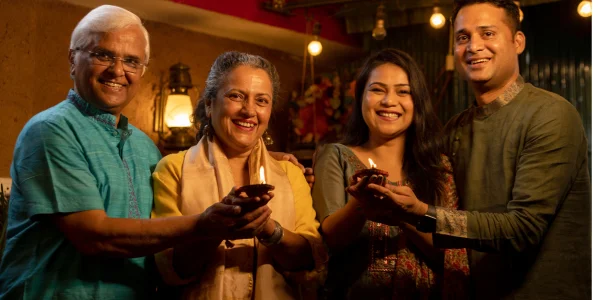The light of Diwali and its festival of lamps may bring bright colors, rangolis, gleam, and warmth associated with family gatherings. However, it is a reminder of hope and prosperity during any festival. But shining behind all the glitter lies another opportunity to connect oneself through the inner self during any festival. This will remind us to give a few minutes to mental well-being, which generally gets sidelined in celebrations. In this blog post, we are going to show how the excitement and ecstasy of Diwali may be managed with mind care and mental well-being.
Impact of Celebrations on Mental Health
Every festival is unique when it comes to having its effects on your mental health. On the one hand, they present an opportunity to reconnect, lift spirits, and share happiness with loved ones. The festive atmosphere around Diwali can be infectious and intensely reviving. However, the same festival can become a source of stress, anxiety, and burnout because of social obligations, family expectations, and the pressures of arranging a flawless celebration. The pressure to smile always proves to be overwhelming to the psyche, and these celebrations have to be balanced for a better nurturing of mental well-being.
Though the festival is joyful and full of lights, many people silently suffer amidst the overwhelming demands of Diwali. This mental health requirement has to be given due importance and implemented to create a balanced atmosphere in the celebrations that give us equal time for our outer and inner worlds.
Common Diwali Mental Health Requirements
Knowing some common emotional issues people have celebrating Diwali enables us to prepare for the festival with empathy and awareness; here are just a few areas of concern for people,
Anxiety: A pressure to expect everything to fall into place in preparation and all the socialization acts and pressure to stay merry or jolly can bring on some anxiety during this time as well.
Depression: For a few, Diwali represents isolation and loneliness, especially those who are unable to see their family or have recently lost someone dear. During this season, sorrow and void become a massive issue because, in society, people generally expect happiness and love at such times.
Financial stress: Diwali may pressure families because of the expenses related to gifts, decorations, and celebrations. Such expenses can cause stress in people who are managing tight budgets. Family dynamics may also bring pressure and tension to gatherings, making it hard to enjoy the festival entirely.
This allows us to approach Diwali with a more balanced and compassionate mind. This practice of recognition of these emotions in the moment without judgment enables.
Mindfulness and Self-Care
Diwali can be a rollercoaster of stress and emotions. Mindfulness and self-care are ways of coping with these pressures and emotions. They involve focusing on what is in front of you and allowing yourself to stand in the beauty of this festival without running and rushing everywhere.
Mindful Celebrations: Instead of doing everything at once, enjoy everything. Inhale the flowers' fragrance, feel the diyas' light, and let go. Mindful celebrations help us enjoy everything about Diwali slowly.
Boundaries: It's absolutely fine to set boundaries as to what extent you wish to engage in society or participate in different types of activities. Be conscious of your energies, and do not stretch yourself too much into events and gatherings. You must give yourself enough time to rest and tell family and friends about this boundary.
Self-care rituals: Self-care might be as simple as putting aside a few minutes in the day to meditate, journal, or some time alone. These practices help create calm reflection amid celebrations to get you grounded during the fun. For example, writing down things you appreciate during Diwali could make staying engaged with your mental wellness easier.
Embracing the Spirit of Giving and Gratitude
Diwali is an excellent time to be thankful; there is enough to thank the Lord for. Writing in gratitude and expressing this attitude impacts mental wellness. The spirit of gifting kindness and good deeds will transform anyone celebrating Diwali.
Practice of Gratitude: Daily reflect on your gratitude for things that help you stay positive and away from things you might have lacked. Gratitude refocuses our focus, shifting our attention to all the good things in life we do have. Whether we think about our loved ones whom we enjoy in our company, relish the moment of sweetmeats sharing, or have the ability to share in any celebration. Letting you know what they are could help with good mental well-being.
Acts of Kindness: You can do acts of kindness, such as donating to needy people or volunteering. This is a good time for Diwali to give back to the community. Helping others spreads happiness and boosts our sense of purpose and connection, fostering good mental health along the way.
Setting Up a Supportive Environment
This could result in everyone enjoying the activities during the Diwali celebrations without harming their psyche. The open environment between families and friends may be developed to enable a person to open up freely without fear of judgment.
Open conversations: Discussing mental health removes the stigma around it. Encourage family members to share their thoughts and feelings. Sometimes, talking about feelings can ease tension and lead to a better understanding of each other's needs.
Create a Safe Space: Focus on creating a place where people feel free and comfortable discussing their mental health issues. Use Diwali to remind everyone how important it is to work together in mutual support and compassion, creating a bond that runs deeper than surface level.
Tips for Diwali Mental Wellness
Your body state largely contributes to healthy psychological perspectives, as exercise has been widely noted to build the mental body positively. This can even include a walk in the morning, a light workout session, or one engaged in his children dancing as long as physical exercise continues.
Here are some additional tips for maintaining mental wellness during Diwali:
Set Realistic Expectations: Don’t force yourself to have a “perfect” celebration. Embrace the little imperfections that make family gatherings unique and memorable.
Take Breaks: Diwali preparations and celebrations can be overwhelming. Step back for a few minutes, take a walk, or enjoy a quiet cup of tea to recharge.
Limit Social Media Exposure: Sometimes, scrolling posts sparks comparison. Keep that outside and let your thoughts run on all the celebrations.
Do mindful things: Rangoli creation or diya lighting can give relief when carried out mindfully. Focus on each action, and breathe deeply while doing so to experience a feeling of earth connection.
Practice Gratitude: Take a minute daily to remember everything you appreciate, whether family, friends, or other little good things.
Communicate to Loved Ones: Reach out to friends and family. Don't fear talking and showing your love. When alone, go volunteer, attend a neighborhood event, or seek out an interest that involves you with someone else.
Save Time for Sleeping: Never forget to enjoy your sleep during those late-night parties and early-morning rituals. A night's sleep does a lot of good for your mood and resilience.
Eating Wisely: While those festive treats are full of temptation, be sure to provide a bit of indulgence. Eat prudently so that you feel much more joyful and vibrant.
Plan a Budget: Heavy financial stress kills festive spirits. Set a reasonable budget for gifts, decorations, and festivities to fit your resources.
Focus on Giving Back: Acts of kindness, such as donations or volunteering, improve mental well-being and make celebrations even more meaningful.
Plan for Some Downtime: Once Diwali festivities wind down, plan a quiet day for self-care to recharge.
Conclusion
Diwali is a festival that brings the light of hope, prosperity, and joy into our lives. The critical reminder here is that true joys in life stem from not letting external celebrations overpower us but through internal peace. Mindfulness, care for oneself, and being open about one's well-being can transform Diwali into an external celebration opportunity for mental wellness.
Being aware of our needs and those of others, we can make Diwali a festival that reveres light both around us and within. Let's celebrate this Diwali by cherishing each moment, practicing gratitude, proactively ensuring our mental well-being, and truly celebrating the festival.
Solh understands. We offer a variety of features to help you invest in self-care and stress management.
Journaling for Self-Reflection: Sometimes, not being able to care for yourself can come from a lack of self-understanding. Solh's journaling feature allows you to explore your thoughts and feelings in a safe space. By reflecting on your experiences and desires, you can gain clarity on what is stopping you from self-care.
Anonymous Support Groups: You are not alone. Solh's anonymous support groups connect you with others who understand the struggle. Share your experiences, find comfort in solidarity, and iscover new perspectives on overcoming the hurdle to indulge in self-care.
Solh Buddy: Feeling lost or disconnected? Your Solh Buddy, a personalized virtual companion, is here to provide encouragement and support. It can offer prompts, celebrate your victories, and remind you of your strengths as you navigate the journey towards self-care.
Talk now: Sometimes, self-care can overwhelm you. Solh's talk now feature gives you access to dedicated counsellors who can help you navigate such situations.
Solh believes in a unique approach to introducing self-care. We empower you to take charge of your well-being by offering a variety of tools. Explore Solh today and discover the power of self-reflection, connection, and support in overcoming any problem of the mind. You are not alone on this path.








